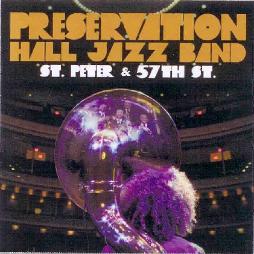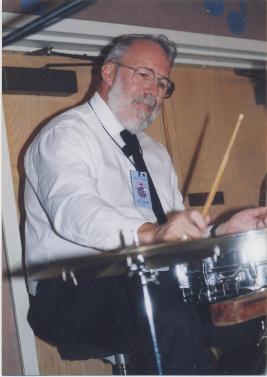|
|
 |
|
|
|
PRESERVATION HALL JAZZ BAND— ST. PETER & 57TH ST.
(Rounder Records No Number). Playing time: 66m. 4
Introduction by George Wein; Burgundy Street Blues; Introduction to the Preservation Hall Jazz
Band by Tom Sancton; Bourbon Street Parade; Introduction to the Del McCoury Band by Ed
Helms; One More ‘Fore I Die; Introduction to Allen Toussaint by Ben Jaffe; Preservation Hall
Jazz Band; Introduction to GIVERS by Ben Jaffe; Just a Closer Walk with Thee; Bonjour Cousin;
Introduction to Steve Earle by Mark Braud; ‘Tain’t Nobody’s Business; Introduction to Tao
Seeger by Ben Jaffe; El Manicero; St. James Infirmary, Part 1; St. James Infirmary, Part 2; Tootie
Ma; Introduction to Merrill Garbus and Frank Demand by Mark Braud; Careless Love; It Ain’t
My Fault; I’ll Fly Away.
Preservation Hall Jazz Band Personnel: Mark Braud, trumpet, vocal; Charlie Gabriel, clarinet;
Ben Jaffe, tuba; Freddie Lonzo, trombone; Clint Maedgen, tenor sax, vocal; Rickie Monet, piano;
Joe Lastie, drums.
Guests: Del McCoury Band; Allen Toussaint; GIVERS; Steve Earle; Tao Seeger; My Morning
Jacket; Troy “Trombone Shorty” Andrews; Blind Boys of Alabama; Merrill Garbus (aka tUnE-
yArDs); (sic)Frank Demond.
Recorded on January 7, 2012, at Carnegie Hall, New York City.
To begin with a small caveat, the review copy of this CD came to me with no liner notes, with
nothing but the track information listed above. I did manage to unearth some data pertaining to
the recording from various sources but cannot vouch for its accuracy.
It’s hard to believe that Preservation Hall is now a half century old. Today the hall and band are
run by tubaist Ben Jaffe, son of Allen and Sandra Jaffe (who were not, as legend has it, the
founders of the institution but did bring it to its maturity, as William Carter shows in his book
Preservation Hall, 1991.) The musical styles prevalent in the city in the early decades of the hall’s
existence are gone, being replaced by some that have a different emphasis, although they can still
be called “New Orleans.” Keenly aware of this metamorphosis, Jaffe has endeavored to keep the
hall and its music relevant and has embraced these changes, not to everyone’s delight. But he
sees it as the way to keep “preserving” the music and the culture of New Orleans (as well as the
institution itself), the goal since the beginning, and this recording is evidence of that direction’s
being taken. And now the Preservation Hall band has made “the big time”—Carnegie Hall—
with this concert to celebrate its half century. Carnegie Hall’s location on (West) 57th St. in N.Y.
coupled with that of Preservation Hall on St. Peter St. in N.O. form the title of the CD.
While the opening track, Burgundy Street Blues, takes a glance back at the earlier style, the next
track, Bourbon Street Parade, looks in the other direction as the band displays the kind of
funk/blues/fusion/rock influence that we hear in the performances of New Orleans bands such
as the Dirty Dozen, the Rebirth, the Squirrel Nut Zippers, etc., some of whom have been around
now for several decades, and the contemporary young bands such as Loose Marbles, Tuba
Skinny, Jazz Vipers, et al. What has always swung the brass bands for me is the syncopation of
the bass drummer, coupled of course with that of the snare drummer, and here Joe Lastie shows
his considerable chops, playing both roles simultaneously. Even if one prefers the older brass
band style, as I must confess I do, no one can say that this track does not swing.
The compatibility of jazz and bluegrass, both forms of folk music, had been already shown in a
previous joint album featuring the Preservation Hall Band and the Del McCoury Band: the
American Legacies CD that the Preservation Hall band issued in April of 2011. It is amply
demonstrated again by the coupling of the two bands here where they play One More ‘Fore I
Die, seamlessly alternating between vocals backed by the bluegrass group and solos from the jazz
musicians.
In similar fashion the other groups and individuals are featured, some more successfully than
others, in attempting more jazz-oriented material than they are used to, perhaps. I was not
particularly taken with the long rendition on St. James Infirmary by Jim James, the vocalist with
My Morning Jacket, which is also accompanied by Trombone Shorty, but the audience certainly
seemed to love it. On Careless Love Merrill Garbus does better with the vocal, other than some
straining at the upper end of her range, but again the audience was highly pleased. Also on this
track Frank Demond, who was for so long trombone player with the band, joins the group.
When Tiffany Lamson of the GIVERS opened Just a Closer Walk with Thee with a throaty,
“breathy” rubato chorus reminiscent somewhat of Janis Joplin, I braced for a disaster as she had
trouble staying in tune, but thereafter she picked up and evened out the tempo, and it came off
fairly well. Even more successful is the following number, Bonjour Cousin, a fairly simple little
ditty—somewhat repetitious, but catchy.
The folk tradition is also represented by Tao Seeger, grandson of folk singer Pete Seeger.
Accompanied by the band, he sings El Manicero, better known perhaps as The Peanut Vendor,
which, with its habanero rhythm, reminds us of the Latin tinge that Jelly Roll Morton insisted
was a key ingredient of jazz.
The entire cast comes on stage for the finale, I’ll Fly Away, and manages to avoid the “mega
mess” in which such mass groupings so often result. It is the only track on this CD where the
Blind Boys of Alabama, the gospel group formed over sixty years ago, are heard, and it provides
a rousing finish to what seems to have been a lively anniversary celebration, only a portion of
which we have on this CD, unfortunately. Reports are that people were dancing in the aisles—
shades of the Benny Goodman concert of 1938!
So this CD displays considerable variety in its program. While I have some difficulty getting my
ears around all the new styles that have been and are developing in the New Orleans music
scene, I appreciate Jaffe’s attempt to nourish the tradition: to keep the music alive and relevant to
the current generation of consumers and, at the same time, to try to preserve what has gone
before in what those of us long in tooth tend to think of as a “golden age.”
Available on line at the following internet sites: Preservation Hall Jazz Band, Amazon, CD
Universe, and probably others.
|
|
|
|
|



